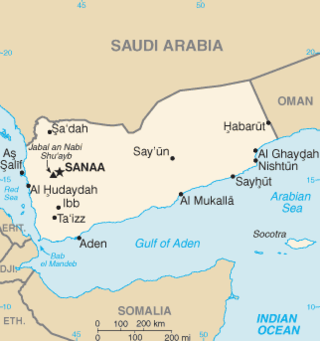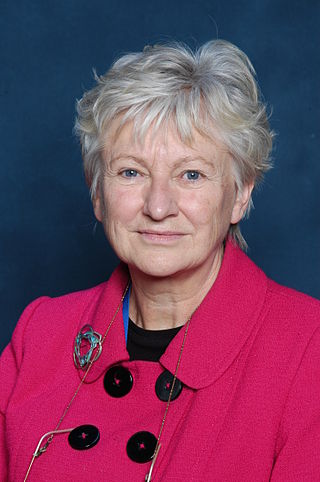
In the United Nations, the Millennium Development Goals (MDGs) were eight international development goals for the year 2015 created following the Millennium Summit, following the adoption of the United Nations Millennium Declaration. These were based on the OECD DAC International Development Goals agreed by Development Ministers in the "Shaping the 21st Century Strategy". The Sustainable Development Goals (SDGs) succeeded the MDGs in 2016.
Information and communications technology (ICT) is an extensional term for information technology (IT) that stresses the role of unified communications and the integration of telecommunications and computers, as well as necessary enterprise software, middleware, storage and audiovisual, that enable users to access, store, transmit, understand and manipulate information.
ODI, formerly the Overseas Development Institute, is a global affairs think tank, founded in 1960. Its mission is "to inspire people to act on injustice and inequality through collaborative research and ideas that matter for people and the planet." It does this through "research, convening and influencing, to lead new thinking and future agendas to deliver transformational change." Its chair is Suma Chakrabarti.
The history of education in Africa can be roughly divided into pre- and post- colonial periods. Since the introduction of formal education to Africa by European colonists, African education, particularly in West and Central Africa, is characterised by both traditional African teachings and European-style schooling systems. The state of education reflects not only the effects of colonialism, but instability resulting from and exacerbated by armed conflicts in many regions of Africa as well as fallout from humanitarian crises such as famine, lack of drinking water, and outbreaks of diseases such as malaria and Ebola, among others. Although the quality of education and the quantity of well-equipped schools and teachers has steadily increased since the onset of the colonial period, there are still evident numerous inequalities in the existing educational systems based on region, economic status, and gender.

Education in Botswana is provided by public schools and private schools. Education in Botswana is governed by the Ministries of Basic Education. and Tertiary, Research Science and Technology Among sub-Saharan African countries, Botswana has one of the highest literacy rates. According to The World Factbook - Central Intelligence Agency as of 2015, 88.5% of the population age 15 and over can read and write in Botswana were respectively literate.

Education in Rwanda has undergone considerable changes throughout Rwanda's recent history, and has faced major disruptions due to periods of conflict. Education was divided by gender whereby women and men had a different education relevant to their responsibilities in day-to-day life. Women were mostly taught housekeeping while men were mainly taught how to hunt, raise animals, and fish. This is because Rwanda was a community-based society where every member had a specific contribution to the overall development of the community. Older family members like grandparents usually took on the role of educators.

Before the arrival of European settlers, who introduced a formal education system addressed to the elites, education in Ghana was mainly informal and based on apprenticeship. Economic activities in pre-colonial Ghana were based on farm produce shared within households and members of each household specialized in providing necessities such as cooking utilities, shelter, clothing, and furniture, and trade with other households was therefore practiced on a very small scale. As such there was no need for employment outside the household that would have otherwise called for disciplines, values, and skills through a formal education system. After colonization, Ghana's economy became a hybrid of subsistence and formal economy.

Education in Guyana is provided largely by the Government of Guyana, through the Ministry of Education and its arms in the ten different regions of the country. Guyana's education system is a legacy from its time as British Guiana, and is similar to that of the other anglophone member states of the Caribbean Community, which are affiliated to the Caribbean Examinations Council (CXC). School curricula, funding, standards and other policies are set by the central government and implemented through the Ministry of Education and related agencies. The Education System is divided into eleven districts, ten of which correspond to the national administrative and geographical regions of the country, while the capital, Georgetown, is treated as a separate education district, district 11. With 8.3% of its GDP spent on education, Guyana sits with Cuba, Iceland, Denmark and Botswana as among the few countries with top spending on education.

Yemen ranked 150 out of 177 in the 2006 Human Development Index and 121 out of 140 countries in the Gender Development Index (2006). In 2005, 81 percent of Yemen's school-age population was enrolled in primary school; enrollment of the female population was 74 percent. Then in 2005, about 46 percent of the school-age population was enrolled in secondary school, including only 30 percent of eligible females. The country is still struggling to provide the requisite infrastructure. School facilities and educational materials are of poor quality, classrooms are too few in number, and the teaching faculty is inadequate.

There have been major strides with Education in Equatorial Guinea over the past ten years, although there is still room for improvement. Among sub-Saharan African countries, Equatorial Guinea has one of the highest literacy rates. According to The World Factbook - Central Intelligence Agency as of 2015, 95.3% of the population age 15 and over can read and write in Equatorial Guinea were respectively literate. Education in Equatorial Guinea is overseen by the Ministry of Education and Science (MEC). Split into four levels, preschool, primary, secondary, and higher education, the Equatorial Guinea's educational system only deems preschool and primary school mandatory. Education in Equatorial Guinea is free and compulsory until the age of 14. Although it has a high GNI per capita, which, as of 2018, was 18,170 international dollars, its educational outcomes fall behind those of the rest of West and Central Africa. In 1993, the gross primary enrollment rate was 149.7 percent, and the net primary enrollment rate was 83.4 percent. Late entry into the school system and high dropout rates are common, and girls are more likely than boys to drop out of school. As of 2015, the net enrollment rates for each education level are as follows: 42 percent for preschool, between 60 percent and 86 percent for primary school, and 43.6 percent for secondary school. UNESCO has cited several issues with the current educational system, including poor nutrition, low quality of teachers, and lack of adequate facilities.

The Ministry of Education (MoE) is a ministry of the Government of India, responsible for the implementation of the National Policy on Education. The ministry is further divided into two departments: the Department of School Education and Literacy, which deals with primary, secondary and higher secondary education, adult education and literacy, and the Department of Higher Education, which deals with university level education, technical education, scholarships, etc.
The UNESCO Institute for Statistics (UIS) is the statistical office of UNESCO and is the UN depository for cross-nationally comparable statistics on education, science and technology, culture, and communication.
Educational equity, also known as equity in education, is a measure of achievement, fairness, and opportunity in education. The study of education equity is often linked with the study of excellence and equity.

Angela W. Little is Professor Emerita at the Institute of Education, University of London. She is known for her work in primary education policy and practice in developing countries as well as education planning, program evaluation and assessment. In particular she has focussed in seven main areas:
The African Virtual University (AVU) is a pan-African effort to create an open and affordable distance learning institution to serve the African continent. The AVU began in 1997 as a project of the World Bank and later developed into an autonomous institution after it was handed over to African governments in 2003. Over the program's lifetime, critics have questioned its efficacy as well as its neocolonial aspects.
TVET refers to all forms and levels of education and training which provide knowledge and skills related to occupations in various sectors of economic and social life through formal, non-formal and informal learning methods in both school-based and work-based learning contexts. To achieve its aims and purposes, TVET focuses on the learning and mastery of specialized techniques and the scientific principles underlying those techniques, as well as general knowledge, skills and values.
Educational technology in sub-Saharan Africa refers to the promotion, development and use of information and communication technologies (ICT), m-learning, media, and other technological tools to improve aspects of education in sub-Saharan Africa. Since the 1960s, various information and communication technologies have aroused strong interest in sub-Saharan Africa as a way of increasing access to education, and enhancing its quality and fairness.
Bob Moon is Emeritus Professor of Education at The Open University (UK). The main focus of his career has been the research, design and development of new models of teacher education in the United Kingdom and more widely. In 2009, he was made a Fellow of the Academy of Social Sciences. In 2018, he was made a Commander of the Order of the British Empire (CBE) in The Queen’s Birthday Honours List for his work on education in developing countries.

Elizabeth Asiedu is a professor of economics at the University of Kansas. She has facilitated research that is centered around foreign aid, foreign directed investment (FDI), and gender. She is a founder of the Association for the Advancement of African Women (AAAWE), as well as the current president of the organization. Asiedu is an editor of the Journal of African Development.

Sustainable Development Goal 4 is about quality education and is among the 17 Sustainable Development Goals established by the United Nations in September 2015. The full title of SDG 4 is "Ensure inclusive and equitable quality education and promote lifelong learning opportunities for all".











